Table Of Contents
You’re not alone if you’re wondering how often to service your ducted air conditioning. This is a common question among homeowners and businesses alike, especially considering the crucial role air conditioning plays in maintaining comfort during Sydney’s varied climate.
Timely and regular maintenance is essential for the system’s performance and longevity. In this article, we’ll explore how ducted systems work, recognise signs that it’s time for a service, understand the importance of regular maintenance, and learn what a typical service involves. Read on to learn more!
How ducted air conditioning works
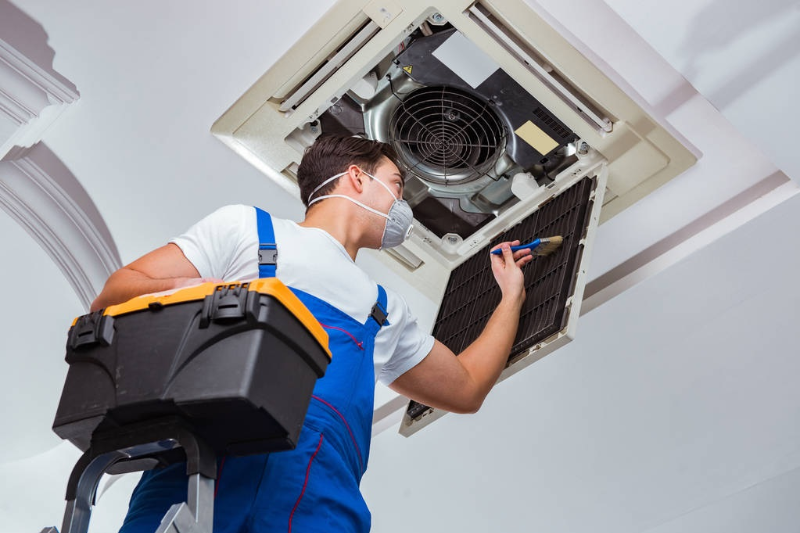
Basic principles of operation
Ducted air conditioning systems are designed to distribute conditioned air through a series of ducts from a central location. This setup facilitates consistent temperature control across multiple rooms or an entire building, making it a preferred choice for larger spaces where consistent climate control is necessary.
Principal components and their functions
The major components of a ducted system include the compressor, condenser, evaporator, and ductwork itself. Each plays a pivotal role in efficiently cooling your space.
The compressor is the heart of the system, pumping refrigerant throughout. The condenser dissipates heat removed from the indoor air while the evaporator cools the air circulated through the ducts.
Benefits of using ducted systems
Ducted systems offer superior efficiency and the ability to maintain uniform temperatures through zoned cooling or heating. They are less intrusive aesthetically, with most components hidden away. They can be customised to allow different zones in your premises to be controlled independently, enhancing comfort and reducing unnecessary energy expenditure.
Signs your system needs servicing
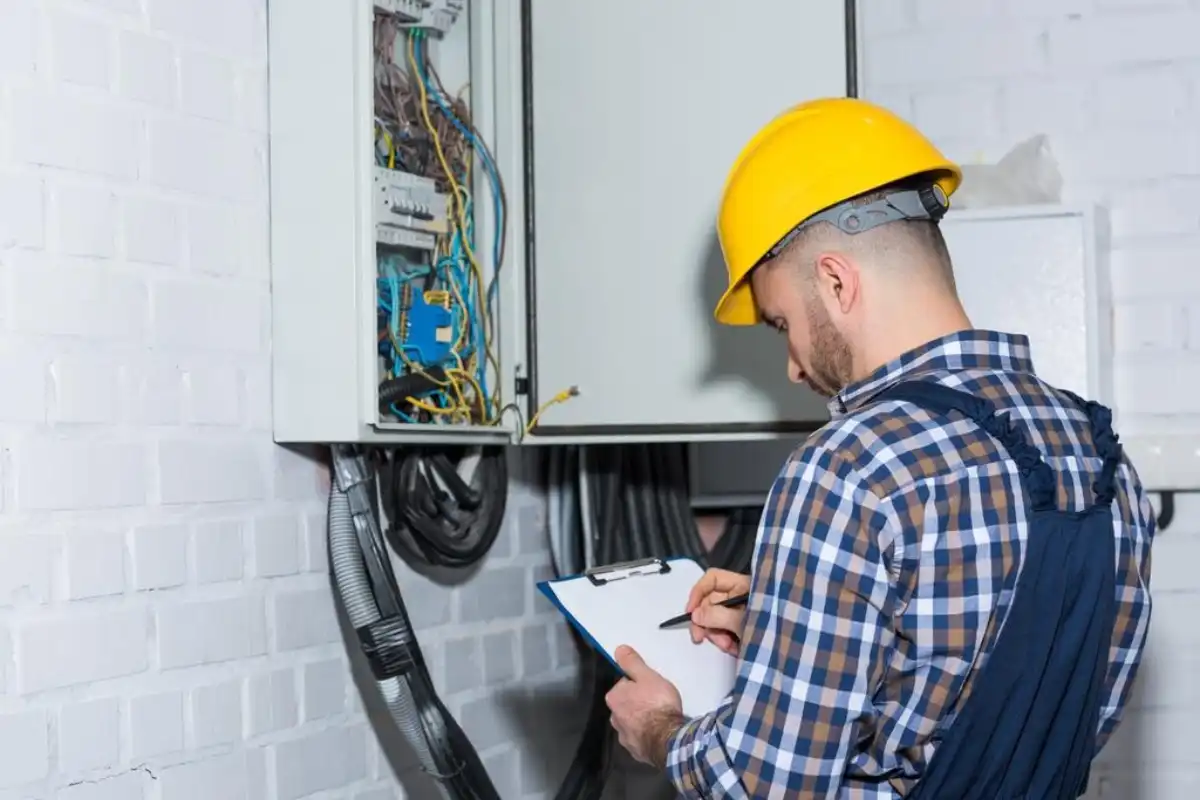
Efficiency loss and increased energy costs
Noticeable inefficiencies, such as increased energy costs, can indicate that your system may be overworking due to issues like dirty filters or leaks. This is a critical sign that servicing is needed to address these issues and restore optimal operation.
Unusual sounds during the operation
Rattling, buzzing, or whistling sounds can be alarming and usually indicate mechanical issues, obstructions, or loose components within your air conditioning system. These sounds call for immediate inspection to prevent further damage.
Temperature inconsistencies and airflow issues
If your system fails to maintain consistent temperatures or airflow is weaker than usual, these could be signs of blockages, duct leakage, or failing parts. Such symptoms highlight the need for a thorough check-up to diagnose and rectify the underlying issues.
Presence of dust and odours
An increase in dust or musty odours when the system runs could suggest that your air filters are clogged or that mould has begun to build up within the ductwork. Regular filter maintenance is essential to maintaining air quality and system efficiency.
The system is running more frequently than usual
A machine that has been running continuously for longer than usual is typically struggling to meet the thermostat settings, possibly due to an undersized system, leakage, or inefficiency. This stresses the equipment and leads to significant wear and tear.
Recommended service intervals
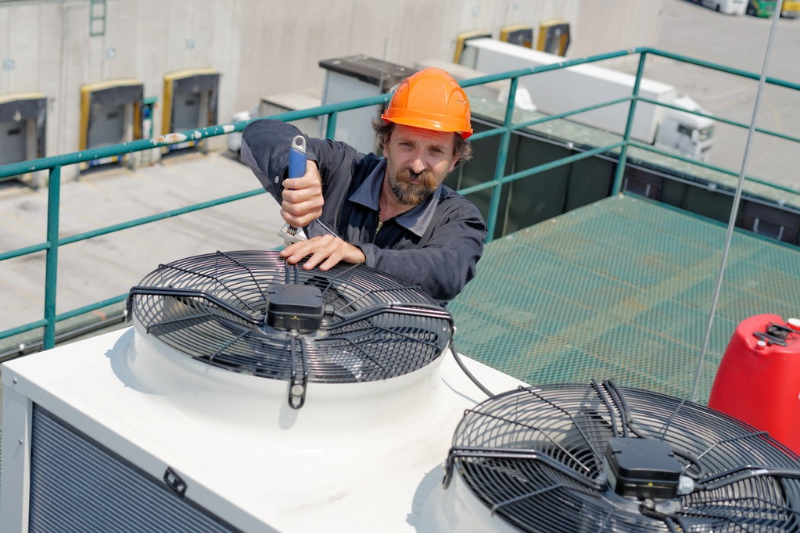
Typical frequency for routine maintenance
Generally, ducted air conditioning systems in residential and commercial settings should be serviced at least once a year. However, more frequent servicing may be necessary for systems under heavy use or in particularly dusty or polluted environments to ensure optimal performance.
Factors affecting service needs
Different factors can influence the need for more frequent servicing, including environmental conditions, usage intensity, and the presence of pets or chemicals that can clog filters or corrode components more quickly.
Importance of regular check-ups in Sydney’s climate
Sydney’s climate, which ranges from hot, humid summers to cool, damp winters, places unique demands on air conditioning systems. Regular servicing ensures your system can handle these conditions efficiently, providing reliable comfort year-round.
Professional assessments and adjustments
During a service visit, qualified professionals will assess the health of your system using specialised tools and knowledge. They will perform necessary adjustments, repairs, or component replacements, ensuring that your system operates at its best, with all safety and efficiency standards met.
Benefits of routine servicing
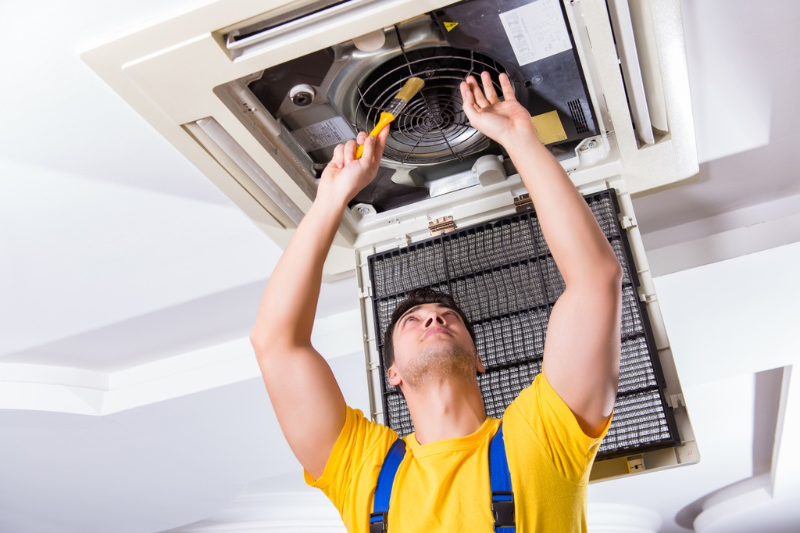
Energy efficiency and cost-effectiveness
Regularly servicing your ducted air conditioning system helps maintain its efficiency, directly translating into cost savings on energy bills. Efficient systems require less energy to achieve the desired indoor climate, reducing energy consumption and minimising environmental impact.
Prolonging system lifespan
Adequate maintenance extends the lifespan of your air conditioning system by preventing excessive wear and tear. By addressing issues early, you avoid significant breakdowns that can be costly and may necessitate premature system replacement.
Improved indoor air quality
A well-maintained air conditioner improves the air quality inside your premises by ensuring that air filters and ducts are clean. This reduces allergens and pollutants, particularly beneficial for individuals with allergies or respiratory issues.
Prevention of major repairs
Routine checks can identify issues before they become significant problems, saving you from unexpected and costly repairs. Regular maintenance also ensures that your system complies with current regulations, which can affect insurance and property values.
Ensuring warranty remains valid
Most manufacturers require proof of maintenance to keep the warranty valid. Therefore, adhering to a scheduled maintenance program can be crucial for warranty support, ensuring you are covered if something goes wrong.
What to expect during servicing
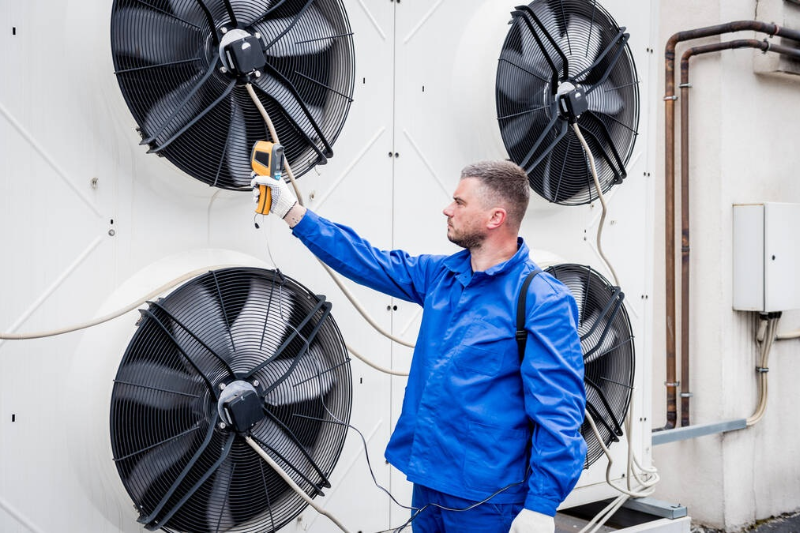
Maintenance tasks overview
A typical service visit includes thoroughly cleaning the system, checking and refilling refrigerant levels if necessary, inspecting and tightening electrical connections, and evaluating the system’s overall performance to ensure it meets safety and efficiency standards.
Importance of thorough cleaning and inspections
Professionals will meticulously clean all accessible parts of the system, such as filters, coils, and ducts, to remove any buildup of debris that can impede efficiency. They will also inspect the system for signs of wear and tear, ensuring that all components are in good working order.
Expertise needed for effective servicing
Servicing ducted air conditioning requires specific skills and knowledge, often necessitating specialised tools and equipment. Technicians are trained to diagnose and rectify complex issues, ensuring your system’s reliability and efficiency.
Choosing the right service provider
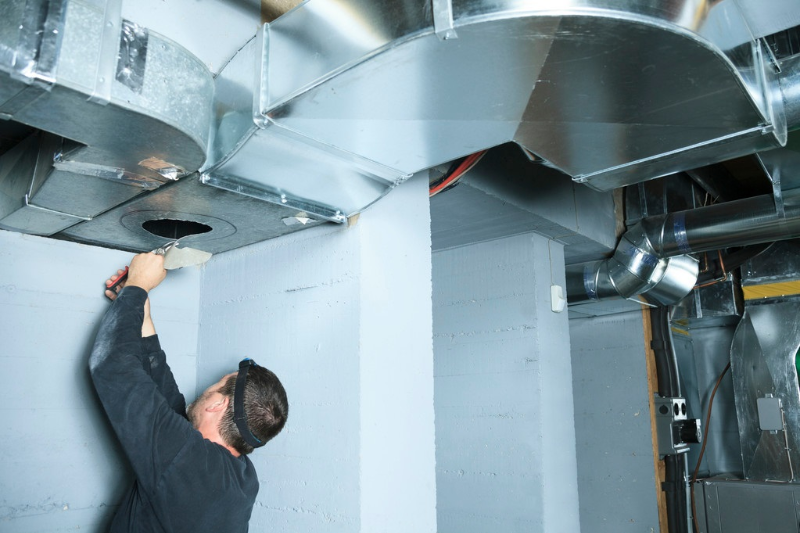
Understanding qualifications and certifications
Selecting a qualified and certified service provider ensures your ducted air conditioning system receives the best care. Look for technicians who are certified by reputable industry organisations. These certifications testify to their knowledge and skills, ensuring they are up-to-date with the latest strategies and regulations.
Evaluating experience and reputation
Experience matters when it comes to HVAC maintenance. Service providers with a long track record will likely encounter and resolve many air conditioning issues, which means they can handle complex problems more efficiently.
Additionally, check reviews and testimonials to gauge the provider’s reputation. Positive feedback from previous customers can provide peace of mind and assurance of quality service.
Considering the scope of service offered
Some service providers might only offer essential maintenance, while others provide comprehensive service packages that include everything from routine checks to repairs and parts replacement. Understanding the scope of what’s provided helps you choose a provider that matches your system’s needs and your expectations.
Assessing customer service and responsiveness
Good customer service is an essential aspect of any service provider. Choosing a company that values clear communication and prompt responses is beneficial. How quickly a provider responds to service calls and is accessible for follow-up questions strongly indicates customer service quality.
Comparing pricing and value
Finally, compare pricing between different service providers, but remember that the cheapest option is sometimes the best. Evaluate what is included in their pricing, such as additional fees for emergency calls or after-hours service. Opt for a provider who offers a fair price while ensuring comprehensive and high-quality service.
Conclusion
Regularly servicing your ducted air conditioning system is essential for efficient operation, especially in Sydney’s dynamic climate. It ensures that your system performs reliably, maintains air quality, and operates cost-effectively, all while prolonging its lifespan.
Take action before extreme weather tests the limits of your air conditioning. Schedule regular check-ups with a professional to keep your system in peak condition year-round. This approach saves you money and ensures continuous comfort in your home or office.



